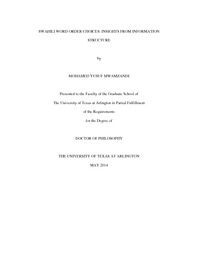| dc.description.abstract | Cross-linguistic pragmatic studies have shown non-canonical word order can often be explained if information structure is taken into consideration. This dissertation explores word order variation in Swahili (SVO, Bantu) adnominal demonstratives and reciprocal constructions under the auspices of information structure. I investigate how the notion of topic may explain word order variation in these two structures.The term `adnominal demonstrative' refers to demonstratives that co-occur with nouns such as huyu mtu `this person' as distinguished from pronominal demonstratives such as huyu `this'. The issue to be determined is what influences the demonstrative use in pre or postnominal position. The data consists of Class 1 (animate nouns) adnominal demonstratives from the Helsinki Corpus of Swahili. Contextual and statistical analyses indicate that the NP+DEM order is used for active topics (continued from previous sentence) while the DEM+NP order reactivates semiactive/inactive topics.The second area explored was that of Swahili Discontinuous Reciprocal (DR) vs. the Simple Reciprocal (SR). While some studies explain the DR and SR as derivatives of the same underlying form, or the DR and SR as distinct structures in the grammar, or the DR as a syntactic strategy to resolve unbalanced coordination, I argue that the variation is motivated by the principle of givenness which requires familiar information to precede new information in a sentence. Corpus examples from conversation and "marry" verbs were analyzed to investigate the effect of givenness and verb category on reciprocal variation. In addition, native speaker judgments on grammatical constructions were elicited using questionnaires administered via the DMDX software. The corpus and acceptability rating results indicated that givenness is the main predictor of Swahili reciprocal variation.This research will benefit those studying pragmatics, deictics, reciprocals and syntax. Further, the study will help Swahili second language learners and instructors to understand the different pragmatic value of the Swahili reciprocal and adnominal demonstrative variants. | en_US |

